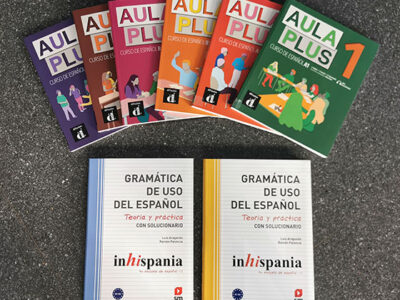
In an intensive Spanish course, each day we learn more words that we add to our vocabulary, and our ability and capacity to express something in Spanish in different ways grows and improves over time.
At the beginner levels of learning, one of the first things we do is learn basic words, among them “gracias” (thank you) and “de nada” (you’re welcome), which are essential for any conversation with native speakers. We use “de nada” almost automatically when someone thanks us for something, but there are many other ways in Spanish to respond to thanks. So, to help you expand your Spanish vocabulary as you progress, today we bring you 10 different ways to say “you’re welcome.”
- Nada, nada
The double repetition of “nada” (nothing) also works as a response when someone thanks you for something. For example:- Thank you so much for lending me your class notes!
- Nada, nada. I was going to throw them away anyway.
- No es nada
We can use this phrase when we want to express that it wasn’t much trouble to help the other person. For example:- Thanks for bringing me my jacket!
- No es nada, I figured it was yours.
- ¡No te preocupes!
This is used when we want to tell the other person not to worry, that it wasn’t a bother for us.- Thanks for bringing me my jacket!
- No te preocupes, I figured it was yours.
- Está bien
We use this phrase to express that what we’re being thanked for is already done or finished, while also saying that it was no trouble.- Thanks for helping me with my homework!
- Está bien, it was just something small.
- Sin problema
We use this phrase to tell the other person that it was no problem at all to help them, meaning we managed to help without any issues. For example:- Thanks for bringing drinks for the party!
- Sin problema, since I was driving, it was no trouble at all.
- Ningún problema
This phrase is very similar to the previous one; we want to emphasize that we had no problem helping with that. For example:- Thanks for listening to me!
- Ningún problema, that’s what friends are for.
- No hay de qué
When we use this expression, we mean there’s no need to thank us, because it wasn’t any trouble or inconvenience to help. For example:- Thanks a million for bringing me the medicine!
- No hay de qué! The pharmacy was right next door, it was no trouble at all.
- Es un placer
We use this phrase to highlight that we enjoyed helping the other person, that we liked helping them. For example:- Thank you so much for helping me with the move!
- Ha sido un placer! Remember that you helped me first, it was the least I could do.
- Con mucho gusto
We use this phrase to express that we were very happy to help, that we gladly agreed and provided our help. For example:- Thank you so much! You didn’t have to bring me a gift.
- Con mucho gusto! I was really excited to give you this book.
- Por nada
This phrase is a variant of “de nada”; the preference for its use depends particularly on the country or region.
- Thanks for coming!
- Por nada! It was a pleasure to visit you in your new home.
Have you heard all these ways to say “you’re welcome”? Which ones do you use most often? Which ones would you like to start using from now on? Have you heard of any others that aren’t on this list? Would you like to practice these expressions with a native teacher? Online Spanish course.
We hope we have helped you improve your Spanish vocabulary a little. Remember that it’s a good idea to check your level from time to time by taking an online Spanish placement test. It’s been a real pleasure!



